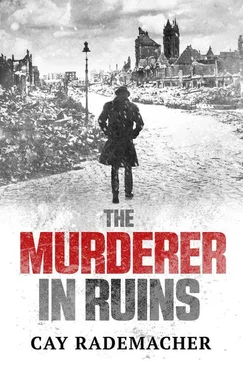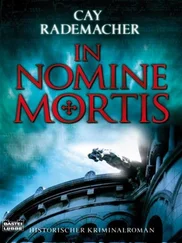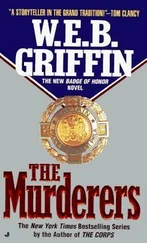Cay Rademacher - The Murderer in Ruins
Здесь есть возможность читать онлайн «Cay Rademacher - The Murderer in Ruins» весь текст электронной книги совершенно бесплатно (целиком полную версию без сокращений). В некоторых случаях можно слушать аудио, скачать через торрент в формате fb2 и присутствует краткое содержание. Год выпуска: 2015, ISBN: 2015, Издательство: Arcadia Books Limited, Жанр: Триллер, на английском языке. Описание произведения, (предисловие) а так же отзывы посетителей доступны на портале библиотеки ЛибКат.
- Название:The Murderer in Ruins
- Автор:
- Издательство:Arcadia Books Limited
- Жанр:
- Год:2015
- ISBN:9781910050750
- Рейтинг книги:5 / 5. Голосов: 1
-
Избранное:Добавить в избранное
- Отзывы:
-
Ваша оценка:
- 100
- 1
- 2
- 3
- 4
- 5
The Murderer in Ruins: краткое содержание, описание и аннотация
Предлагаем к чтению аннотацию, описание, краткое содержание или предисловие (зависит от того, что написал сам автор книги «The Murderer in Ruins»). Если вы не нашли необходимую информацию о книге — напишите в комментариях, мы постараемся отыскать её.
The Murderer in Ruins — читать онлайн бесплатно полную книгу (весь текст) целиком
Ниже представлен текст книги, разбитый по страницам. Система сохранения места последней прочитанной страницы, позволяет с удобством читать онлайн бесплатно книгу «The Murderer in Ruins», без необходимости каждый раз заново искать на чём Вы остановились. Поставьте закладку, и сможете в любой момент перейти на страницу, на которой закончили чтение.
Интервал:
Закладка:
‘I’ll take this floor, you take the next one up,’ he told Ruge. ‘After that, we’ll take it in turns until we’ve been through the whole bunker. Ask them all if they noticed anything near where the body was found. Anything, no matter how trivial. And don’t ask them just about the past 24 hours; ask about the last few days. It’s possible the body was lying there a while. If anybody refuses to talk, put pressure on them. A lot of these bunker people don’t like talking to anyone, let alone the police.’
Ruge grinned, clicked his heels and put his right hand on his truncheon. Stave noticed, but didn’t say anything. He was far too weary to start playing nursemaid to overzealous uniformed coppers.
Stave knocked on the wooden boards of the first of the ‘apartments’ that in reality were more like rabbit hutches. No reply. He pulled aside a dirty piece of cloth hung there to cover the entrance. Inside was a Wehrmacht stretcher that served as a bed, supported by two wooden fruit boxes; dirty clothing lay on the floor and on the wall was a school leaving certificate, the paper yellow and torn. On a sheet on the stretcher lay an emaciated young man, snoring. Stave shook his shoulder. The boy groaned and turned to face the wall, without opening his eyes. He stank of home-made hooch, obviously drunk. Stave gave him a punch on the shoulder but he didn’t react. Just grunted. There was no point.
He tried the next hutch. Empty. Then the next. He rapped on the bare board.
‘If you’re looking for somewhere to kip, try next door,’ a hoarse voice cried out. ‘There’s nobody in there any more. But don’t let the warden catch you, and don’t make any noise.’
‘Police, crime squad,’ Stave replied, and pulled aside an old heavy overcoat that covered the door. It was an oilskin, probably a sailor’s.
Against the wall opposite stood a pair of rusty bunk beds without mattresses. On the lower bed was a rumpled blanket and an old rucksack obviously used as a pillow. The bed above was missing the metal webbing a mattress would normally lie on. Instead there were a couple of boards set across the frame as a sort of shelf, with an old seaman’s duffel bag stuffed so full that at any moment Stave thought the board it lay on would give way and empty its contents on to the bed below. In front of the bunks stood an ancient armchair, ripped fabric of an indeterminate colour, the back covered in soot. Obviously looted from some bombed house.
On the armchair squatted a man whom Stave initially would have put at around 70 years old. Then he took a closer look and changed his mind: maybe 50. Iron-grey hair, unwashed for weeks. Greasy strands that reached down to his shoulders. A white halo of dandruff on his shoulders, like snow against his thick, navy-blue, woollen sailor’s jumper. Dark trousers and heavy, iron-heeled working boots. A man who once must have been big and strong. His muscles, still impressive, could be seen beneath his slack wrinkled skin. He had blue eyes, bushy eyebrows and a scar as wide as a finger that ran from the left corner of his mouth across his cheek as far as his neck behind one ear. Despite the cold his sleeves were rolled up, revealing blue tattoos on his forearms: an anchor, a naked woman, a word that Stave couldn’t read. A seaman run aground, the chief inspector thought. He put one hand on the grip of his gun while he pulled out his police ID with the other.
‘Anton Thuman,’ the man said, without getting up. There was nowhere else to sit, except on the lower bunk bed, which Stave did not fancy. So he stayed standing as he told the man that the naked body of a woman had been found nearby.
‘What’s that got to do with me?’ Thuman interrupted him before he could finish.
‘Were you out on Baustrasse during the past couple of days? Or near Landwehr Station? Did you see anything suspicious?’
‘I hardly ever go out. Too cold. I’m sort of hibernating here in this bunker. As soon as the port is open and the English let proper ships come in again, I’m out of here. Until then I’m just squatting in this dump trying to move as little as possible.’
Stave described the victim as well as he could. ‘Do you recognise her?’
Thuman gave a dirty laugh. ‘I know lots of naked young women. Some cost more than others. Could be any one of them, from the way you describe her.’
The chief inspector took a deep breath, despite the foul air. ‘Is there any young lady who’s been living here who might meet that description? Mid-blond, medium-length hair, blue eyes, about 20 years old?’
He laughed, then shook his head. ‘How would I know? I’m happy enough to have nothing to do with anybody else. Two doors along there’s that young drunk, out of his head day and night. Next door there was somebody with tuberculosis coughing all the time. Then after him some family turned up, none of whom spoke German; French probably, maybe DPs from some camp or other. Never exchanged a word with them though I heard them whispering to one another from time to time. The walls are thin. Then one of your colleagues came along and took them away. Now it’s vacant again, but sooner or later somebody will crawl their way into it. I couldn’t care less. Every night some woman screams as if somebody’s hacking her hand off. It’s dreadful. But if you think I might know who is wandering around in here? No idea. And I’ve only been to any of the other floors the one time. What’s the point? I don’t know anybody here and don’t go sniffing around anybody else, not even some young blond cutie. I just want a bit of peace. And that’s hard enough to find.’
‘Thank you for your help,’ Stave said, and left without saying goodbye.
An hour later he met up with Officer Ruge at the entrance to the bunker. Stave took a breath of fresh air.
‘Never thought I’d be glad of this goddamn Siberian storm,’ he said, shaking his coat, as if he felt the stench of hopelessness would stick to his clothing.
Even Ruge looked pale, tired and sweaty. ‘Bunker people!’ he wheezed as if that explained everything.
The chief inspector nodded. The concrete caves were the last resort of outcasts, those who’d given up all hope, those who had nobody. Anyone who had a modicum of strength left escaped from them, built themselves a hut out of rubble and cardboard somewhere out in the ruins, rather than stay buried alive under six metres of reinforced concrete.
‘I came across one old boy,’ Stave said, ‘who went into his sleeping neighbour’s cubicle and tore down two pieces of paper from the wall: kids’ drawings. When I asked him why he did it, he just said he hated everything that made the bunker nicer. Mad.’
‘Nobody admits to having seen anything in the ruins opposite,’ Ruge said. ‘Nobody even admits being over there recently. Nobody noticed anything suspicious. Nobody knows any young woman. I’d have arrested the lot of them.’
‘Why? They’re already in a prison,’ Stave said wearily, bashing one hand on the concrete wall. ‘Nobody said anything sensible to me at all. I believe them. I think few of them ever go out.’
‘It looks like we have no witnesses, Chief Inspector.’
By now it was nearly midday. Stave was hungry and tired. At least it’s good I don’t have to talk, he thought.
Ruge drove the Mercedes past more piles of rubble, the heavy vehicle bumping in and out of potholes. Stave had to hold on tight, so as not to be thrown out of his seat.
‘Sorry,’ the young policeman said, his brow creased in concentration. ‘It’ll get better in a bit.’
And indeed in the Old Town and New Town districts large areas of the main streets had been cleared. Stave leaned back in his seat and closed his eyes until they reached police headquarters.
The tall building on Karl-Muck-Platz was an 11-storey sandstone colossus built back in the 1920s: reddish-brown stone with white windows, modern, no chimneys. It used to be the seat of an insurance company until the police crime squad moved in after the war. Most of the officers didn’t care much for the place, even though they appreciated the fact that it was mostly undamaged. Windows that closed properly were a rarity in Hamburg these days. Stave liked the building because it was the exact opposite of the great neo-baroque concert hall opposite – as if the crime squad wanted to demonstrate police strength and order in the face of light-hearted frivolity.
Читать дальшеИнтервал:
Закладка:
Похожие книги на «The Murderer in Ruins»
Представляем Вашему вниманию похожие книги на «The Murderer in Ruins» списком для выбора. Мы отобрали схожую по названию и смыслу литературу в надежде предоставить читателям больше вариантов отыскать новые, интересные, ещё непрочитанные произведения.
Обсуждение, отзывы о книге «The Murderer in Ruins» и просто собственные мнения читателей. Оставьте ваши комментарии, напишите, что Вы думаете о произведении, его смысле или главных героях. Укажите что конкретно понравилось, а что нет, и почему Вы так считаете.











